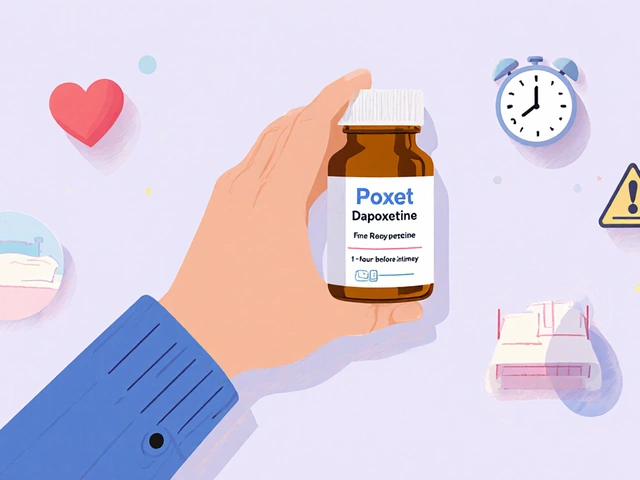
If you clicked expecting a miracle detox pill, here’s the straight talk: Scotch thistle can be a useful bitter herb, but it’s not a cure-all, and the human science is thin. I’ll show you where it helps, where it doesn’t, how to use it safely, and smart alternatives if your goal is liver support or digestion. No hype-just a practical plan you can use today.
- TL;DR
- Evidence for Scotch thistle (Onopordum acanthium) is mostly lab and animal; there are no solid human trials for big claims like liver protection.
- Best realistic use: as a bitter tonic to nudge digestion/appetite, and as an antioxidant source-if you tolerate bitters.
- Safety: avoid if pregnant, breastfeeding, allergic to Asteraceae (ragweed family), have ulcers, reflux, or gallstones; check meds for interactions.
- Confused with milk thistle? They’re different plants. Milk thistle has human data for some liver markers; Scotch thistle does not.
- In New Zealand, treat it like a supplement (food) with limited claims; don’t forage the plant-it’s a pest weed in many regions.
What Scotch Thistle Can (and Can’t) Do: Evidence, Benefits, and Who It’s For
Scotch thistle (Onopordum acanthium) is a spiky Mediterranean plant that’s spread widely-including across New Zealand farmland, where it’s often labeled a pest. As a supplement, it shows up as capsules, teas, and liquid extracts. People buy it for liver health, antioxidant support, and digestion. Here’s the key: most of the strong liver claims floating around the internet belong to milk thistle (Silybum marianum), not Scotch thistle. The two are cousins, but not twins.
What’s the actual science? The best we have for Scotch thistle is preclinical: test-tube and animal work showing antioxidant and anti-inflammatory activity in extracts rich in flavonoids (think luteolin and apigenin derivatives). That sounds promising, but it doesn’t prove real-world benefits in humans. There are no large, well-controlled human trials showing that Scotch thistle improves liver enzymes, reverses fatty liver, or protects you from alcohol damage. If you want that level of data, milk thistle and artichoke leaf have more to stand on.
So why do people still use it? Bitters. Plants that taste bitter can stimulate saliva, stomach acid, and bile flow reflexively. That’s why some folks take Scotch thistle before meals to spark appetite and tame that heavy, sluggish feeling after greasy food. If you’re a “bitter tea before dinner” person, Scotch thistle can fit that routine.
What can it not do (based on current evidence)? It won’t undo a heavy night, cure a diagnosed liver disease, replace your statin, or let you ignore sleep, diet, and movement. If someone sells it to you like a magic detox, walk away.
Who it may suit:
- People who tolerate bitter herbs and want a gentle nudge for appetite or digestive sluggishness before meals.
- Those who prefer rotating herbs and want variety beyond gentian or artichoke leaf.
- Folks exploring antioxidant-rich plants, without expecting disease-level outcomes.
Who should skip or be cautious:
- Anyone with ragweed or daisy family allergies (Asteraceae). Scotch thistle is in that family.
- People with reflux, gastritis, ulcers, or gallstones-bitters can poke the bear.
- Pregnant or breastfeeding people-there’s no safety data.
- If you take meds affected by stomach acidity, diuretics, or have complex med lists-check with your clinician.
I live in Wellington, and even here I see the same mix of curiosity and confusion. My wife, Vivienne Crawford, is a “tea before dinner” person; I’m the label hawk. Between the two of us, we’ve learned one simple rule: match the herb to the job. If your job is “help my digestion feel lighter,” bitters can help. If your job is “improve my liver blood tests,” pick an herb with human data or talk to your GP about the root cause first.
“Natural does not always mean safe.” - National Center for Complementary and Integrative Health (NIH)
That line is worth taping to the pantry. Plants have power. Respect it.
| Herb | Latin name | Main traditional use | Human evidence for liver markers | Common extract notes | Best for | Key cautions |
|---|---|---|---|---|---|---|
| Scotch thistle | Onopordum acanthium | Bitter tonic, appetite support | No robust trials | Non-standardized powders or tinctures; bitter profile | Pre-meal digestive nudge | Asteraceae allergy, reflux/ulcer, pregnancy, gallstones |
| Milk thistle | Silybum marianum | Liver support | Some human trials of silymarin; mixed but stronger than Scotch thistle | Standardized to silymarin (e.g., 70-80%) | Liver enzyme support alongside lifestyle changes | Drug interactions possible; check meds |
| Artichoke leaf | Cynara scolymus | Digestion, lipids, bile flow | Human data for dyspepsia and lipids exist (varied quality) | Standardized leaf extracts available | Post-meal fullness, mild dyspepsia | Bile duct issues; gallstones-medical advice first |
Short version: if your target is the liver, milk thistle or artichoke leaf usually make more sense. If you love the bitter routine or want to rotate herbs, Scotch thistle can be part of that-just keep expectations grounded.

How to Use Scotch Thistle Safely: Dosing, Quality, and NZ-Specific Tips
First, a clear statement: there’s no gold-standard dose for Scotch thistle because we don’t have strong human trials. What we do have are label ranges and traditional bitter use. That means you’ll lean on practical rules more than hard numbers.
Safe-start plan:
- Clarify your job-to-be-done. Is it “feel lighter after meals,” “support appetite,” or “liver repair”? Be honest. If it’s liver repair, talk to your doctor and consider better-evidenced options.
- Pick a form that fits your routine:
- Liquid bitter (tincture or glycerite): easiest to take 15-20 minutes before meals; fastest taste feedback.
- Capsules/powders: better if you hate bitter tastes; slower feedback.
- Tea: very mild; good for a gentle start.
- Start low for 3-7 days. With a tincture, think a few drops in water before one meal daily. If fine, slowly step up to before two meals. Stop if you get reflux, cramping, or nausea.
- Use for 2-4 weeks, then reassess. Bitters are best as tools, not forever crutches. If you need them long-term, look at diet, alcohol, meds, and stress as bigger levers.
- Keep a simple log. One line per day: dose, timing, how your stomach felt, any side effects. Patterns beat guesses.
Choosing quality (quick checklist):
- Clear species name: look for Onopordum acanthium on the label. If it says milk thistle or Silybum marianum, that’s a different herb.
- Part used: aerial parts or leaves are common. Avoid vague “thistle blend.”
- Extraction info: for liquids, a ratio (e.g., 1:3) and solvent (often alcohol+water). For capsules, note milligrams per capsule and any standardization (rare for Scotch thistle).
- Contaminant testing: heavy metals, microbes. Reputable brands state testing or provide a batch COA on request.
- Country of origin and manufacturer transparency: the fewer mysteries, the better.
New Zealand notes (as of 2025):
- Supplements here are regulated more like foods than medicines. You’ll see careful wording on labels-no disease claims. That’s normal under the Food Act and Dietary Supplements Regulations.
- Scotch thistle the plant is a pest in many regions. Do not forage or plant it. If you use it, use a commercial product to avoid spreading weeds.
- If a product promises to cure liver disease or “detox” your organs, be skeptical. NZ regulators don’t allow those claims for supplements.
Smart pairing and timing tips:
- Bitter synergy: pair with lemon peel tea or gentian for a stronger pre-meal bitter hit-if you tolerate bitters well.
- Don’t stack three bitters at once on day one. Add one at a time so you can read your body’s signals.
- Hydration matters. Bitters work better when you’re not running on two coffees and a dry sandwich.
- Alcohol extracts can irritate sensitive stomachs. If that’s you, try glycerites or capsules.
Interactions and safety flags:
- Alergies: if you react to ragweed, daisies, or chamomile, be careful. Start tiny or avoid.
- Ulcers/reflux: bitters can worsen symptoms. Skip or get medical advice first.
- Gallstones/bile duct issues: bitters can stimulate bile flow-get clearance from your clinician.
- Medications: if your meds have a narrow safety window, or you take acid-suppressing drugs, diuretics, or many prescriptions, check in with your pharmacist.
- Pregnancy/breastfeeding: no safety data-avoid.
Two quick self-tests to decide if it’s worth it for you:
- Bitter tolerance test: put one drop of a Scotch thistle tincture on your tongue. If you find it intensely bitter and feel saliva flow, you’re likely responsive. If you taste almost nothing, bitters might not do much for you.
- Meal effect test: take your chosen dose before your main meal for three days. If fullness, gas, or heaviness ease by day three, you’re a responder. If nothing changes-or symptoms worsen-park it.

Comparisons, Checklists, and Your Next Steps
Think through your goals first, then match the herb.
Decision rules:
- Primary goal is liver lab support? Choose milk thistle first, with diet and alcohol moderation. Retest labs with your GP.
- Primary goal is post-meal heaviness and mild dyspepsia? Try artichoke leaf or gentian. Scotch thistle can be a secondary option if you prefer its taste or rotation.
- Primary goal is to “detox”? Fix sleep, fiber, and water intake before any herb. No plant will outrun poor basics.
Pitfalls to avoid:
- Confusing Scotch thistle with milk thistle and expecting the same results.
- Starting high and quitting early because you got reflux. Bitters need micro-dosing in sensitive people.
- Taking it at random times. Bitters shine 15-20 minutes before a meal.
- Buying mystery blends with no species or part listed.
Cheat-sheet for busy humans:
- Goal: lighter digestion → small bitter dose before meals → reassess in 2 weeks.
- Goal: liver support → milk thistle or artichoke leaf + lifestyle → check labs in 8-12 weeks.
- Sensitive stomach → glycerite or tea, go slow, stop if burning or nausea shows up.
- Multiple meds → pharmacist check before you add any herb.
Common label ranges you’ll see in stores (not medical advice):
- Liquid extract: often 0.5-2 mL before meals, 1-3 times daily, depending on strength. Start with a few drops.
- Capsules/powders: there’s no standard. You’ll see 250-500 mg per capsule. Lower is safer to start.
- Tea: 1-2 teaspoons dried herb steeped 10 minutes. Mildest effect.
When to stop immediately:
- Hives, swelling, wheezing, or severe stomach pain-seek urgent care.
- Sharp right-upper abdominal pain if you have known gallstones-call your clinician.
- Any new, worrying symptom that lasts more than a day after stopping.
Mini-FAQ
- Is Scotch thistle the same as milk thistle? No. Different species, different active compounds, different evidence. Milk thistle has standardized silymarin and human data; Scotch thistle doesn’t.
- Will Scotch thistle lower my liver enzymes? No strong proof in humans. If that’s your aim, talk to your GP and consider milk thistle as part of a plan.
- Can I pick it from the roadside? Don’t. It’s a pest weed in many NZ regions and can spread easily. Use commercial products and follow local rules.
- How long can I take it? Use in short blocks (2-4 weeks), then reassess. If you need it daily for months, fix diet, fiber, and timing of meals first.
- Can I mix it with coffee? You can, but bitters work best before meals with a little water. Coffee can mask taste and irritate some stomachs.
Next steps if you’re ready to try:
- Pick one product that clearly lists Onopordum acanthium, part used, and extraction details. Avoid blends at the start.
- Do a 3-day micro-dose test before dinner. Log how you feel. No benefit or you feel worse? Stop.
- If you benefit, keep it for 2-4 weeks before main meals, then take a break and see if the effect holds with good habits.
- Layer the basics: protein at breakfast, 25-30g fiber per day, steady hydration, and evening walks. These move the needle far more than any herb.
Troubleshooting by persona:
- Busy parent with reflux: skip Scotch thistle; try chamomile tea after meals and earlier dinners. If reflux persists, see your GP.
- Desk worker with mid-afternoon bloat: try a tiny pre-lunch bitter dose and a 10-minute walk after eating. Reduce carbonated drinks.
- Weekend athlete with heavy post-BBQ meals: a bitter before the meal plus half your plate as salad and beans; drink water between drinks.
- Taking multiple meds: bring your supplement and med list to your pharmacist. Ask plainly: “Any interaction concerns with this herb?”
Final word on expectations: if you buy it for gentle digestive support and you start low, you’ll probably know within a week if it helps. If you buy it as a liver fixer, you’ll be disappointed. Choose the right tool for the job, use it cleanly, and keep your basics tight. That’s how you actually transform your health-one honest step at a time.
One last housekeeping note: the term Scotch thistle supplements gets thrown around loosely online. Always confirm the Latin name-Onopordum acanthium-so you’re not judging the wrong plant.
18 Comments
Chris Remo
August 31, 2025 AT 07:44 AM
Same. I thought it was just hype but tried the 3-day test like the post said. Felt lighter after meals. No drama. Not a cure, just a helper. Keep it simple.
Michael Herr
September 1, 2025 AT 01:31 AM
Scotch thistle isn't milk thistle don't get fooled by the name
Crystal Magnant
September 1, 2025 AT 22:08 PM
My mom used to drink bitter tea after meals when she had digestion issues. She’d say ‘if it tastes like regret, it’s probably working.’ I laughed but now I get it 😅
Danie Joy
September 1, 2025 AT 22:10 PM
they dont want you to know this but the real liver detox is the government removing all the fluoride and chemtrails from the water and replacing it with real herbs like this one which is banned in 12 countries because it works too well and people stop buying pharma drugs
Katherine Stapp
September 2, 2025 AT 12:13 PM
USA has the best supplements. This post is just another woke herbalist trying to make us feel bad for wanting to feel better. If you're not taking Scotch thistle you're not living. 🇺🇸🔥
Frank De Silva
September 3, 2025 AT 10:34 AM
Interesting. But let’s be honest-this is just another ‘bitter tea’ for people who can’t afford real medicine or don’t understand biochemistry. The preclinical data is weak, and the tone feels like a blog post written by someone who reads too many wellness newsletters.
KJ Miller
September 3, 2025 AT 20:42 PM
Love this grounded approach. So many people chase ‘miracle herbs’ and ignore sleep, water, and movement. You nailed it-herbs are tools, not crutches. Start low, listen to your body, and don’t forget to walk after dinner. Small wins add up 💪
Claire Battista
September 4, 2025 AT 04:24 AM
Thank you for writing this. I’ve seen so many people get burned by misleading supplement claims. Your note about NZ regulations and pest weeds is especially helpful. Always good to know what you’re putting in your body-and where it came from.
Erin DeGroot
September 5, 2025 AT 02:59 AM
I’ve been using milk thistle for my fatty liver, and I was curious about Scotch thistle because of the name similarity. This clarified everything. I’m glad I didn’t waste money on something that doesn’t have the evidence. Thank you for the honesty.
Stephanie Bryant
September 6, 2025 AT 01:32 AM
Just a heads up-some brands mix in milk thistle and call it ‘thistle blend’ so check the label real close. I bought one last month and it was 80% milk thistle. Totally misled me 😅
Drashti patel
September 6, 2025 AT 22:25 PM
In India we have similar bitter herbs like neem and karela-used for digestion for centuries. Science is catching up, but tradition has always known: bitter = digestive fire. This Scotch thistle fits right in. Just don’t expect it to fix your 3am pizza habit.
Kaitlin Crockett
September 7, 2025 AT 15:29 PM
Does anyone know if it interacts with metformin?
Tracy Blake
September 7, 2025 AT 18:02 PM
It’s funny how we’ve gone from ‘everything natural is good’ to ‘everything natural is dangerous’ and now we’re stuck in this weird limbo where we need a PhD in botany just to take a tea. I mean, humans have been chewing bitter roots for 50,000 years. Why are we suddenly so scared of plants? Maybe the problem isn’t the herb-it’s that we’ve forgotten how to listen to our bodies.
Leo Lee
September 8, 2025 AT 14:57 PM
Scotch thistle? That’s a New Zealand weed. Why are Americans importing pest plants as supplements? We have enough problems without bringing invasive species into our medicine cabinets. This is cultural appropriation of ecology.
Isabel Piaggi
September 9, 2025 AT 08:21 AM
My aunt took this for her gallstones and ended up in ER. Not worth the risk. If you have any biliary issues just skip it. I know people love herbs but some things aren’t worth gambling with
Tom McInnes
September 10, 2025 AT 07:41 AM
Well-researched. Clear, concise, and free of hyperbole. Rare these days. Thank you.
Stephanie Cepero
September 10, 2025 AT 08:20 AM
Thank you for including the personal note about your wife and your label-hawk tendencies-it made this feel human. I’m going to try the 3-day test this week. And yes, I’ll be logging my stomach. No excuses.






Daniel Rogers
August 30, 2025 AT 14:09 PM
Just tried the Scotch thistle tincture before dinner last week 😅 honestly? My post-burger bloating went from ‘I need to lie down’ to ‘huh, that was fine.’ Not magic, but a quiet little win. Also, no more guilt when I eat pizza. 🙌